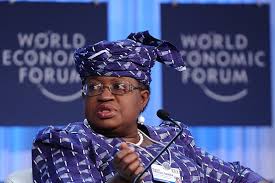The Ebola outbreak in West African countries is not seriously affecting the Nigerian economy, Finance Minister Ngozi Okonjo-Iweala said. Nigeria has recorded 21 cases of the virus, and eight people have died within its borders, according to the World Health Organization. There were no current confirmed cases as of September 10, the health ministry says.
“We have a team monitoring the economic impact and we do not feel we are yet at the point where we can say it is having a huge impact on the economy,” Okonjo-Iweala said in an interview with Bloomberg TV Africa. “There has been some fall-off in hotel occupancy, in Lagos in particular, some meetings have been postponed, but you still have other businesspeople who are arriving.”
Ebola has killed at least 2,288 people in Guinea, Liberia and Sierra Leone, countries on Africa’s Atlantic coast that don’t border Nigeria. On Sept. 9, the parent of Nigeria’s biggest company, Dangote Cement , said it was postponing a planned investor day in Lagos, the commercial hub, as a result of Ebola-related travel fears. Okonjo-Iweala also said that the country’s Excess Crude Account, where a portion of oil revenue is stored to cushion the economy against volatility, stands at $4.11 billion.
The minister said in January she was concerned that a decline in the account balance to about $2.5 billion at that time had left the economy “vulnerable” and should be redressed this year. The country plans to open the Development Bank of Nigeria in the next six to nine months. The lender will initially be capitalized with $2 billion, a figure that may rise to as much as $10 billion, and fill a gap in Nigerian business lending, the minister said.
“It’s very difficult for businesspeople, especially small and medium-sized enterprises, to find any money for five years, seven years,” she said. “Mostly they can borrow for a year to three years. If you want to build a business sustainably and you want your economy to have sustained growth you’ve got to fix access to finance.”
The development bank will be partly financed by the Nigerian government, and is also due to receive $500 million each from the World Bank and the African Development Bank, and a credit line from the German development bank, KfW Group, she said.
“It’s going to be strong and get rated,” she said. Debt Risks Referring to recent African Eurobond issues, Okonjo-Iweala said governments should exercise discipline in borrowing. She negotiated debt relief for Nigeria from the Paris Club group of creditors in 2005 during her first stint as finance minister.
“It has to be investment with high returns to justify the borrowing, but even then I would be very cautious and I think on the continent we shouldn’t get too enamored with floating these bonds,” she said.
African nations from Senegal to Kenya have sold sovereign debt this year as borrowing costs dropped to a 15-month low in August, according to JPMorgan Chase & Co. indexes. The West African nation of Ghana said it had sold $1 billion of bonds due January 2026 that were priced to yield 8.25 percent.
“We have to watch it so we don’t find ourselves as a continent back in the situation we were in before,” the minister said. “Each time you go to float these Eurobonds, you should do it making sure you get reasonable yields. I’m not one to say, let’s rush out and accumulate a lot of debt, maybe because of my experience trying to get debt relief.”

